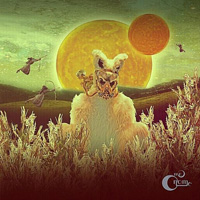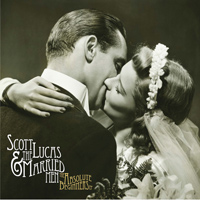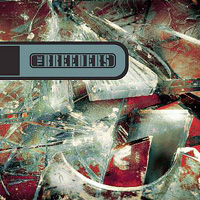 No Regrets: A Rock ‘N’ Roll Memoir
No Regrets: A Rock ‘N’ Roll Memoir
by Ace Frehley (Gallery Books/VH1 Classic)
by Scott Deckman
Wanna rock all night, and party every day? Ace Frehley, he of the Spaceman makeup and Cherry Sunburst Les Paul did, and now he tells his life story in No Regrets: A Rock ‘N’ Roll Memoir.
Pretty thin as bios go, the narrative portion of No Regrets checks in at just under 300 pages, but it is fairly informative on Ace the guitarist and Ace the man. Born Paul Frehley to an odd pairing, his engineer father the son of Dutch and German immigrants and his mother a farm girl from the South, Ace grew up pretty rough in the Bronx, NY, when he probably didn’t have to. The Bronx of Frehley’s youth wasn’t quite the Bronx we know today, but it was still tough, filled with neighborhood gangs, including the mostly-Irish Ducky Gang (or, in his case, the Junior Duckies), which Ace ran with as an adolescent. The way he tells it, this was back when being in a gang was more about raising hell with your buddies than dealing dope and drive-by shootings (we’re talking the mid-’60s). Fights, sure, but they used fists, maybe a bat, knife or chain, at worst, a zip gun or two. It was mainly about getting wasted, committing larceny, chasing girls, looking cool, and defending your turf.
Oh, the halcyon days of youth.
So, yeah, a pretty smart guy (Frehley brags he scored 163 on an IQ test), like many rockers in their formative years, Frehley couldn’t be bothered with school. He wanted his kicks, and right or wrong, he got’m. And yes, here’s another tired trope (this paragraph is full of them), but one that’s nonetheless true (for Ace, at least): His involvement in rock’n’roll may’ve saved him from hard time or worse, as learning the guitar was much preferable to trolling the neighborhood looking for trouble. Ace was born into a musical family, with his dad being “an accomplished concert pianist”; his mom also tickled the ivories, as did his brother Charlie and sister Nancy, who also formed a folk group. As soon as the 12-year-old Frehley strummed a power chord on his friend’s new electric guitar, he “immediately fell in love.”
In the spring of 1967, that love was consummated at the RKO 58th Street Theatre in Manhattan where he saw the Who and Cream take part in “Murray the K Presents Music in the 5th Dimension,” a concert series promoted by legendary local DJ Murray the K. (The real interesting tidbit here? Neither band was a headliner.)
We read how ladies’ man Frehley (who admits he looks part-Asian; Ace claims it’s due to some rumored Cherokee blood) got his nickname: For being able to hook his friends up with tail. Beer and girls went hand in hand for Frehley, the lowering of inhibitions we’ve all felt when drinking. And things get interesting when we learn that the fledgling guitarist was a rock’n’roll Forrest Gump of sorts, boldly daring to go backstage at concerts (dressed in the latest outré fashions, he looked the part) where he hobnobbed with various bands’ crews and some famous rockers themselves, including John Kay of Steppenwolf and even Jerry Garcia. The first time he pulled this stunt he was able to help set up Mitch Mitchell’s drums at the 1970 New York Pop Festival, who, of course, was accompanying one of his idols, Jimi Hendrix.
Ace played in a succession of bands, doing the club circuit, trying to make it, hustling like all musicians do. He relays a particularly hairy incident where, drunk, he got into a disagreement with a bar owner about payment after a gig and got knocked on his ass, getting his cheekbone crushed in the process. Not only that, but Ace claims the doctor told him the cheekbone came within 1/16 of an inch from puncturing his brain, almost killing him. Amazingly, the cheekbone popped back into place during surgery without it splintering or having to use any wires.
Fate smiled on him again, when, after answering an ad in the Village Voice, he auditioned (driven into Manhattan by his mother) for an embryonic band with members named Gene Klein, Stanley Eisen, and Peter Criscuola. He was brash, rude, and bazaar (as commonly reported, he wore mismatched sneakers to the audition, one orange shoe, one red), his attitude rubbing Gene the wrong way. But after a while, he eventually landed the gig.
Ace tells of the many practice sessions and conversations about the band’s image and name. They decided to be a theatrical hard rock band modeled somewhere between Alice Cooper and the New York Dolls, but they wanted to take it even further. Throwing around names, Paul finally struck pay dirt with KISS; they also changed their names to Gene Simmons, Paul Stanley, Peter Criss, and Ace Frehley, with each adopting a signature character.
We get the gigging, the influence of manager Bill Aucoin, the signing to impresario Neil Bogart’s Casablanca Records (they were the label’s first act), the ever-evolving characters and makeup, the stage show ideas: Pyro, Ace’s smoking guitar, Gene spitting blood and fire, the spurious satanic accusations and the initial hardships of touring the first few records when Casablanca (and Aucoin and Bogart, personally) was spending more money than they were taking in staging the KISS juggernaut, and this despite the fact that their stage show was becoming a huge draw. Whatever you say about their theatrics, this was a professional band hell-bent on making it.
And they were incredibly prolific; from their 1974 debut KISS through 1977, the band released a staggering eight albums (though two were live records). We also get the band dynamics: Ace and Peter the partiers who hung out together, Gene and Paul all business. Ace even says he wasn’t sure if he should feel sorry for Gene because he seemed devoid of friends. He also felt “he had a stick up his ass.” Ace also claims he thinks Gene is a sex addict. Where have we heard that one before? Another thing, the two roomed together during the first several tours, with Ace calling him “an epic slob.”
For interested fans, Ace answers Gene’s accusation of his laziness by saying that early on “I carried my share of the load before concerts.” But that he “rarely carried equipment afterward.” Ace claims everyone agreed it was better that the guitarist, who drank heavily while onstage, sleep it off in the truck (and yes, he was a big drinker throughout his KISS years and beyond). Regardless, despite their differences, it’s important to note that in the beginning, Frehley claims the band was a four-part democracy. In fact, Frehley said the band was “sort of a family. A strange, dysfunctional family comprising disjointed and unrelated parts, but a family nonetheless.” Further, he credits Gene and Paul for not demanding the lion’s share of the earnings, as they were KISS’ primary songwriters (and really, the band’s prime movers. Though Ace said Aucoin had a lot to do with this economic bonhomie).
With nothing to lose and hemorrhaging money, the band gambled and decided to release a live album in 1975, one of the mother of all live albums, Alive!, and they finally broke. With Alive!, the band was able to harness their live sound on tape, and KISS was always as much or more about spectacle than musicianship, and fans, who they made by constant touring and word of mouth, ate it up. And Frehley weighs in on the controversy of the record not really being live, but a pastiche of various live and studio recordings.
Infused with cash for the first time, the band went and got producer Bob Ezrin to make their statement record. On Destroyer, which, incidentally, was the first album I ever owned at three years old, given to me by my cousin, the band made a diverse, somewhat baroque album that pissed off a lot of their fan base, who were more inclined to the meat-and-potatoes hard rock KISS was known for. Many see it as their high-water mark. Though Destroyer stalled a bit after a quick start out of the gate, when enterprising DJs flipped single “Detroit Rock City” over and started playing “Beth,” co-written and sung by Criss, the damn thing took off again (“Beth” itself was later released as an A-side single to capitalize on its popularity). Destroyer eventually reached multiplatinum status (though some sources say the same thing for sales of Alive!, the Recording Industry Association of America officially lists that album as merely “gold”). It was all a bit ironic, as “Detroit Rock City” is probably the greatest song KISS ever recorded, prominently featuring Ace’s flamenco-style solo, which, incidentally, he didn’t write himself.
And the fact he didn’t was a symptom of a larger problem, as things began going awry in the group dynamic. On Destroyer, outsiders not only helped craft more songs than on albums previous, but non-credited guitarist Dick Wagner subbed for Frehley on “Sweet Pain”; he played on “Beth” and “Flaming Youth” as well. Ace says his partial MIA was a combination of stress Ezrin put him under and hangovers he suffered from partying (Frehley first discovered cocaine during the album’s recording). One thing was certain: He wasn’t happy at Ezrin’s drill sergeant approach to creating art.
Around this time KISS began resembling a rock’n’roll corporation, and the marketing of the band, especially to kids, with dolls, lunchboxes, makeup kits, you name it, started to wear on Frehley, who, in his heart of hearts, was still a musician first. He began to feel a little like a trained seal. Getting electrocuted just before hitting the stage on December 12, 1976, at the Lakeland Civic Center in Florida couldn’t have helped matters. Though it did inspire the song “Shock Me,” which appeared on 1977’s Love Gun, the first KISS number he sang, in fact.
The loads of drugs and alcohol he consumed are chronicled here as well, and as commonly known, you don’t get much done, or at least accomplish anything consistently good, when habitually wasted. Plus, you’re just a pain in the ass. I won’t even broach KISS Meets the Phantom of the Park, where his acting skills didn’t exactly win an Academy Award. (During one infamous scene where Frehley was missing during filming, his stunt double, a black man, donned the Spaceman makeup and costume and stood in for him.)
Finally, after the often-bashed concept album Music from “The Elder”, Frehley decided he’d had enough of the band and its artistic direction, and left. (And with Peter leaving, or forced out of the group, earlier, Ace was usually outvoted two-to-one on band business, another reason for his departure. While Frehley appeared on the cover of follow-up record Creatures of the Night, sources differ on whether he played on it. Either way, it’s safe to say he had very little involvement with that album.) Of course, by this time Ace’s partying had gotten out of hand, and he’s crashed enough cars over the years to prove it.
He went solo, buoyed by the success of Ace Frehley, one of four solo records KISS members released on the same day as a marketing ploy in 1978; his sold the best and produced a minor hit in “New York Groove,” which, again, he didn’t write. Over the years, Ace has released various solo efforts, including 2009’s Anomaly, which allmusic.com gave an impressive 4.5 stars.
Speaking of car wrecks, Ace relays one truly remarkable escapade in 1983 involving drunk driving. Frehley led cops on a high-speed chase throughout Westchester County, NY, in his DeLorean, drunk as a skunk, flying through red lights, bouncing off embankments and other cars, even “going about sixty miles an hour against traffic on the Bronx River Parkway.” This was real video-game, World’s Wildest Police Videos stuff. Thinking he’d eluded capture, Ace pulled into a deli to call a friend to come get him. He was going to report his beat-to-shit car stolen. Well, the deli’s owner had other ideas; Taking a look at Frehley and the condition of his car, he called the cops. Ace was then arrested. The funny thing was, the officer who tried to pull him over early on in the chase, Jimmy Jenter, ended up being a mentor and friend who tried to help Ace beat his alcohol addiction. Well, Frehley’s had many relapses.
We read of his friendship with John Belushi, all the chicks he nailed while both single and married, all types of sordid rock star stuff. He doesn’t seem too contrite, either, it’s told matter-of-factly. He seems like a pretty happy-go-lucky, nay, sleazy guy, at times. Ace even describes what he believes was an alien encounter.
Of course, readers will want to know about the 1996 reunion (which was all of 15 years ago; time really does fly as you get older). And things went okay for a while, but with differing attitudes, an at-times knotty history, and millions of dollars floating around, the original lineup couldn’t last forever – and didn’t.
The plectrum that may’ve broke the camel’s back for Ace was when his daughter Monique’s part in movie Detroit Rock City was unceremoniously dropped without so much as a phone call from Simmons, one of the film’s producers. The teenager was crushed. But even with three-quarters of the band’s original members in their 60s now (and Stanley will hit the big 6-0 very soon), don’t bet against the four of them going out on the road again, though maybe this time in walkers and wheelchairs.
As of this writing, Ace has finally sobered up and is still making music. Whatever you say about the man, he’s a survivor – and one of the unique guitar Gods of all time.
(www.acefrehley.com)



